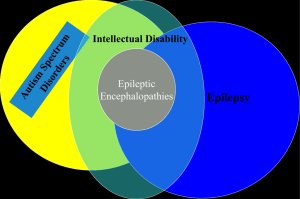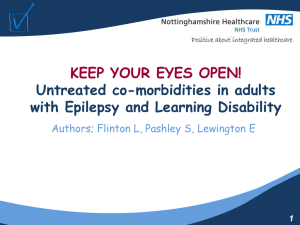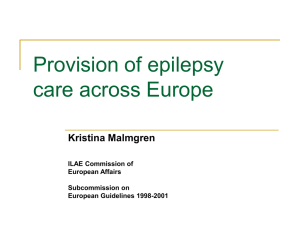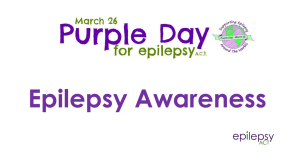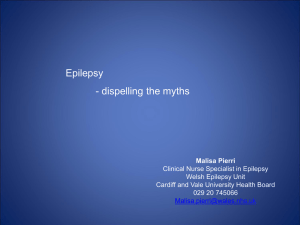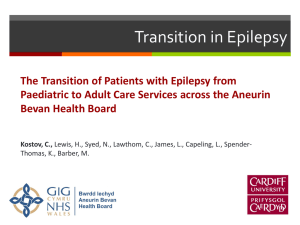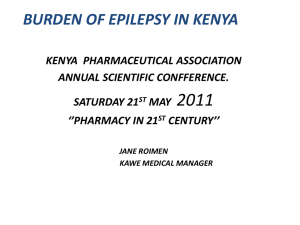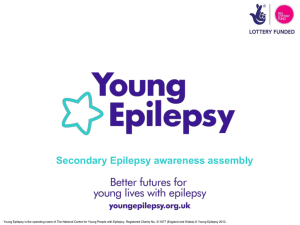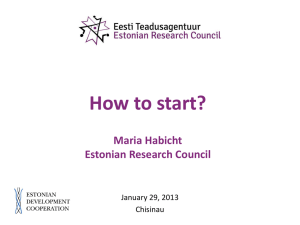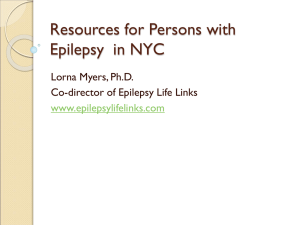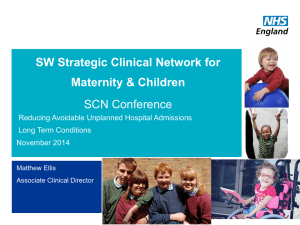Promoting Epilepsy in Europe
advertisement
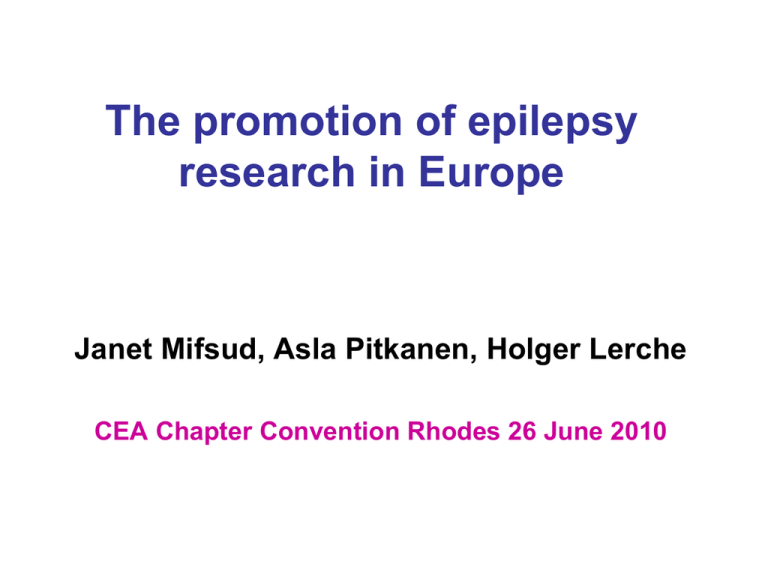
The promotion of epilepsy research in Europe Janet Mifsud, Asla Pitkanen, Holger Lerche CEA Chapter Convention Rhodes 26 June 2010 Benefits of Participation • collaborative, multidisciplinary and translational research preferred, working on both basic and clinical research • prestige and benchmarking performance • networking opportunities – research and teaching • mobility of staff and students • increase in research capacity and funding • note that FP7 operates on the basis of cofinancing,and you cannot make a financial profit. So funding should not be your only reason for participation Do you wish to help to promote epilepsy research in Europe? If yes…… Useful tactics • Set up a lobbying group : bring ILAE and IBE chapters together and work with other countries • Collect data about numbers of PWE in your country • Translate ınformation in your language • Raise your institution’s profile: Go to the press • Identify and foster key political contacts especially in Brussels and EU institutions • Make use of information: Epilepsia, 2009 Research priorities in epilepsy for the next decade – a representative view of the European scientific community. Epilepsia 2009; 3: 571578. ILAE Commission on European Affairs Task Force EU presidency • For the next countries which will hold presidency of EU, try to get epilepsy on the agenda – – – – – – July - Dec 2010 Jan - June 2011 July - Dec 2011 Jan - June 2012 July - Dec 2012 Jan - June 2013 Belgium Hungary Poland Denmark Cyprus Ireland Example : EBC • In an exciting development for the EBC, the Hungarian government has chosen neuro psychiatric diseases as its main R&Dtheme under the Hungarian EU Presidency in the first part of 2011. • Under the leadership of Tamàs Freund, a former EBCBoard member, a workshop was held in Budapest on 10 May to plan the central event on this theme, a congress to be held over 18-19 March 2011, during annual Brain Awareness Week. Suggestions for concerted action • Go to http://cordis.europa.eu/fp7/ncp_en.html See who your national contact point for Health is, and try to get a few concrete suggestions from them wrt including epilepsy in FP7. • We then recommend that you obtain the name of the Programme Committee Member (PCM) for Health from the NCP and contact them directly and give them this text: • In this way we are passing the same message across Europe…… • This already worked to a certain extent in 2011 call Proposed text for PCMs to include in 2012 call Suggested Theme 1. Health 2. TRANSLATING RESEARCH FOR HUMAN HEALTH 2.2.1. Brain and brain-related diseases Topic Description Epileptogenesis: Understanding the causes of epilepsy to improve therapy Abstract The causes and pathogenesis of epilepsy, summarized commonly under the term ‘epileptogenesis’, are still largely unknown. This topic invites collaborative research projects with focus on specific aspects of epileptogenesis including genetic, epigenetic, transcriptional, developmental, and inflammatory mechanisms. A better understanding of the individual causes of epilepsy will pave the way to personalized medicine with selection of patients for novel, rational based treatment strategies. Funding Scheme: Large scale integrated research project Justification / Expected Impact : • Epilepsy is a common multifactorial neurological disorder affecting 6 million people in Europe. The total European health costs associated with epilepsy have been estimated to be €15.5 billion. About one third of all epilepsy patients remain refractory to current therapy of this devastating and disabling disease, implying an urgent need for novel treatment strategies. • Research of the last two decades – with a fundamental impact from leading European scientists organized in the mentioned European research networks – has revealed the first molecular mechanisms in different genetic and acquired forms of epilepsy. To better understand and integrate epileptogenic mechanisms into pathways is a major challenge of epilepsy research and will have significant therapeutic implications for novel rational and personalized therapeutic concepts. Justification / Expected Impact (cont) • From our previous experiences, we know that understanding of such a complex human brain disease is only possible with the added value of a large, multidisciplinary research consortium providing the necessary numbers of both patients and techniques. • Likewise, a translation into novel treatments requires a concerted approach with the necessary infrastructure. • Given the importance of epilepsy as a common disease, such kind of research promises to have important consequences for European health care. Refer to previous projects • EU-funded Integrated Project Epicure – (Giuliano Avanzini; avanzini@istituto-besta.it; www.epicureproject.eu) • European project EpiGen – (Sanjay Sisodiya; s.sisodiya@ion.ucl.ac.uk; www.epilepsygenetics.eu) • EU-funded Integrated Project Euripides – (Mathias Koepp; m.koepp@ion.ucl.ac.uk; www.euripideseurope.com ) Other possible schemes : COST • COST www.cost.eu European Cooperation in Science and Technology, allows the coordination of nationally-funded research on a European level. • It makes it possible for various national institutes, universities and private industry to work jointly on a wide range of R&D activities. • It has been successfully used to maximise European synergy and added value in research co- operation and is a useful tool to further European integration. • Ease of access for institutions from non-member countries also makes COST a very interesting and successful tool for tackling topics of a truly global nature. DG Education: Life Long learning • Lifelong Learning Programme (LLP) enables individuals at all stages of their lives to pursue stimulating learning opportunities across Europe. • It is an umbrella programme integrating various educational and training initiatives. LLP is divided in four sectorial sub programmes and four so called 'transversal' programmes. – Comenius for schools – Erasmus for higher education – Leonardo da Vinci for vocational education and training – Grundtvig for adult education DG Sanco Health programme http://ec.europa.eu/eahc/health/index.html – The Health Programme is the European Commission’s main instrument for implementing the EU health strategy. – It aims, through projects, to improve the level of physical and mental health and well-being of EU citizens and reduce health inequalities throughout the Community. – it supports health-promoting and preventive actions that address the major health determinants – The first Programme of Community action in the field of public health (2003-2008) financed over 300 projects and other actions. Links • Contact your local MEP and inform him/her about epilepsy http://www.europarl.europa.eu/members.do?lang uage=EN • Check if you know any MEPs from your country who are on the European Parliament Committee on Industry, Research and Energy http://www.europarl.europa.eu/activities/expert/c ommittees/allMembers.do?committee=2424&lang uage=EN • Links • Go to http://cordis.europa.eu/fp7/home_en.html and surf through the website: different programmes, calls, information services etc. • Go to the advisory groups for FP 7 Health and check if you know anyone from the list and contact them. http://ec.europa.eu/research/fp7/pdf/advisorygroups/health-members.pdf#pagemode=none How to get inside knowledge? Become an expert evaluator for FP7 https://cordis.europa.eu/emmfp7/ Become an expert evaluator for DG Sanco http://ec.europa.eu/eahc/phea_ami/ Continue the discussion…. CEA - EU Symposium Discussion Group Funding of epilepsy research in Europe Chairs: Bialer M (Israel) Baulac M (France) • Need of research funding: a voice of the patient Williams E (United Kingdom) • EU funding instruments Tosetti P (Belgium) • Industry as a partner of EU research funding for epilepsy Salonen R (Finland) Monday 28 June 11:30-13:00 Hall 7 (Colossus)
